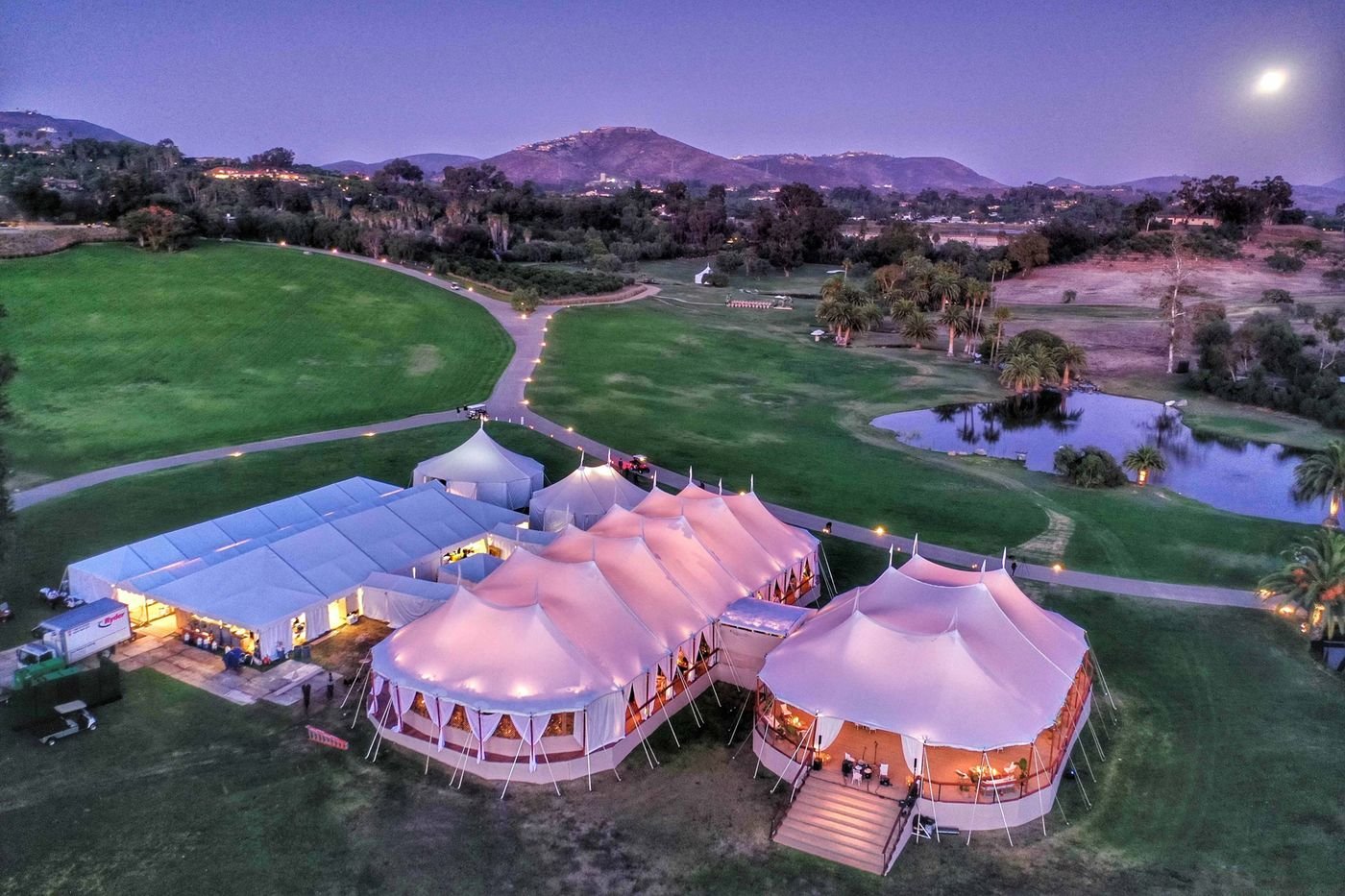By Anna Katherine Clemmons
February 11, 2022, 8:00 AM EST
Kirk Thomas and Caroline Shea got engaged in August 2019. Shea, then 23, wanted the wedding to be outdoors on her grandfather’s 2,500‑acre lakefront property outside Birmingham, Ala. She envisioned an elaborate, nature-inspired affair for 400 people, and she hired a wedding planner and design team to make it happen.
When you have a wedding planner and a design team—and a grandpa who’s a commercial contractor—you don’t just buy a few backyard barbecue tents at Home Depot. You hire a company such as Skyline Tent Co. to transport guests to a world that pushes the boundaries of exactly what it means to be outdoors.
Twin brothers John and Miles Hingeley started Skyline in 2004. Anyone who reads glossy wedding magazines or spends time on certain corners of Instagram and TikTok knows their work. Skyline, based in Charlottesville, Va., is one of the U.S. tenting companies most sought after by people hosting elaborate weddings or other events where a planner might need to ask: “Where do you think the restroom trailer should be parked?”
Its services are so in demand that, if you want to hire the company, you should make sure everyone is OK with a long engagement. Even in nonpandemic times, the logistics of tenting an event such as the Shea-Thomas nuptials is complicated. Nine months before the April 2021 wedding, John Hingeley, the company’s president, toured Dick Shea’s property with a drone to get a lay of the land. “If the foundation isn’t right, the rest of the wedding isn’t right,” says Neillie Butler, Shea’s wedding planner. “It’s like a house.” Hingeley, Butler, and Skyline project manager Gordon Miller assessed whether there should be one big tent or several smaller ones, what sort of terrain Skyline would be working with, and if they’d need to build a road to get equipment on‑site. (Skyline crews have constructed roads up mountains and bridges over rivers.) Could there be, as Caroline Shea wanted, multiple bars? A stage for the band? Would it be possible for the couple to bid guests farewell by sailing away on an antique boat?
For the Hingeleys, the answer is almost always yes. “They really don’t see obstacles,” says Al Dyess, chief executive officer of CE Rental Inc., a holding company that’s been an investor in Skyline since 2017. “They are very focused on, ‘What is the best solution?’ ”
Skyline didn’t start as a tenting company. The Hingeleys were in construction and supplemented their income by renting a modest 20-by-20-foot tent for backyard parties. Tenting “wasn’t really a master plan,” John says. But he and Miles accumulated inventory, and by 2007—when their younger brother, Jay, joined the business—they were tenting for the University of Richmond and wealthy clients in Virginia.
If the 1980s and ’90s were about lavish parties in ballrooms, the late 2000s were about the great outdoors. Some of this was an inevitable shifting of trends, but some of it was practical: Tents can be customized in ways that catering halls can’t. “A tent,” says Jill Lafferty, former editor of InTents magazine, “creates a blank room where you can do anything.”
Skyline branched into the Carolinas, becoming one of the only companies of its kind that could offer an extensive inventory beyond its home base. The Hingeleys bought a 30,000-square-foot warehouse in 2008, which let Skyline expand its offerings to include heat and air conditioning units, glass walls, and custom flooring and handrails. To clean the tents, the company spent $150,000 on a massive, custom-built washing machine. The tents are hung from a 42-foot-high clothesline to dry.
In 2009, Martha Stewart featured sailcloth tents made by Sperry in Weddings magazine. Skyline was the first in Virginia to offer them. But it was tenting Gwyneth Paltrow’s 2018 wedding to Brad Falchuk in Amagansett, N.Y., that gave Skyline a new level of exposure, including mentions in People, on Paltrow’s Goop website, and across social media.
That much publicity is unusual. Many clients ask Skyline to sign nondisclosure agreements, which is why it won’t detail what the buffet of options costs. Officially, John says, “we are efficient, flexible, and extremely loyal to our customers. Our mission is to add value to every project.” Event planners who hire a company like Skyline typically have a budget starting around six figures. “If your total event budget is $400,000, you can still have a really nice event, and we can be involved with it,” John says. The company doesn’t disclose revenue. According to the American Rental Association, the industry is expected to take in $55.9 billion this year, up 11% from 2021.
Today, Skyline has 30 to 50 employees and hires seasonal workers. Special events make up only 40% of the business. Smaller local projects in Virginia and other work for governments, corporations, higher education, and music festivals account for the other 60%. During the pandemic, Skyline pivoted to Covid‑19 response support. It tented military bases, hospitals, universities—and later restaurants, workplaces, and vaccination sites. The biggest issue it’s having now is a familiar one: navigating supply chain problems and meeting demand.
The Hingeleys and their team aren’t daunted. “John and I are usually at that first meeting making big promises,” says Pierce Woodsmall, a Skyline planning and design consultant. “But then there is the peril of those promises—can we live up to them?”
Indeed, Caroline Shea’s answer would be yes, and she’s not alone. The main attraction at her wedding was a 1,000-pound tent—held up by 27 metal poles—that withstood fierce winds in the days prior to her tying the knot. Her wedding day was sunny with a light breeze. After the ceremony, guests walked across a footbridge to the reception. “This is absolutely stunning,” one said. Another asked, “Where are we?”
